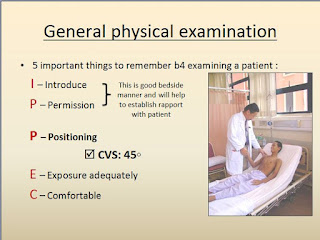General Examination Of Cardiovascular System
Cardiovascular system:
1.General Examination:
PICCLE
P - Pallor
I - Icterus
C - Cyanosis
C - Clubbing
L - Lymph Adenopathy
E - Edema
Pallor:
Can be seen in Anemia
Female - 12.5 to 15.5 gm/dl
Male - 13.5 to 17.5 gm/dl
Icterus:
Yellowish discoloration of skin in mucous membrane and body fluid.
Bilirubin - 0.1 to 0.2 mg/dl
Hyper bilirubin - 2 to 3 gm/dl
Cyanosis:
Bluish discoloration of skin and mucous membrane.
Seen in peripheral areas.
Example:
Cynotic heart disease
Clubbing:
Can be seen in cynotic congenital disease.
Clubbing is a painless soft tissue swelling in terminal phalanges.
Schamorth's window - In phalanges
Lymph Adenopathy:
Part of immune system which are involved in tissue fluid circulation is Lymph nodes.
Can be seen in cervical axillary supraclavicular.
Edema:
Tissue swelling due to increase in interstitial fluid.
Can be seen in heart failure.
2.Arterial pulse:
Rate
Rhythm
Volume
Character
Rate:
Normal 60 - 100 beats/min
Sinus bradycardia - < 60 beats/min Hyperthermia, severe hypoxia, sleep (children)
Sinus tachycardia - > 100 beats/min Hypovolumia, myocardial infarction, excercise, emotion (infants)
Rhythm:
Regularly irregular - AV blocks
Irregularly irregular - Atrial fibrillation
Volume:
Normal 30 - 60 mmHg
(a) Small volume pulse - Shock, CF
(b) Large volume pulse - High output
3.Blood pressure:
The lateral pressure exerted by the column of blood on the atrial wall while the heart pumps blood constantly to all parts of the body is called blood pressure.
Systolic:
Normal - 120 mmHg
Pre Hypertension - 120 to 139 mmHg
Hypertension Stage 1 - 140 to 149 mmHg 2 Stage 2 - > 150 mmHg
Diastolic:
Normal - 80 mmHg
Pre Hypertension - 80 to 89 mmHg
Hypertension Stage 1 - 90 to 99 mmHg Stage 2 - > 100 mmHg
4.JVP (Jugular Venous Pressure):
Fluctuation of right atrial pressure during the cardiac cycle generates a pulse that is transmitted backwards into jugular veins.
Patients - 45° lying
Suprasternal notch or behind the sternocoedomastoid muscle measured.
Elevated congestive cardiac failure.
JVP falls during hypovolumic shock.
5.Examination of Pericardium:
Parallel - COPD
Funnel - Depression in lower position of the sternum.
Pigeon chest shape - Sternum displaced anteriorly; anteroposterior diameter.
6.Palpitations:
Finger tips of pulsation
*Base of fingers to trills.
*Base of fingers to heaves.
Aortic, Tricuspid, Erbs sound, Mitral



Comments
Post a Comment